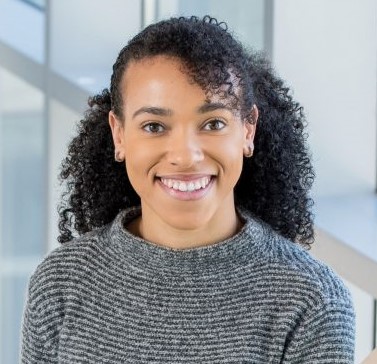April 2024: Dr. Andreana Cunningham (CAS Archaeology, Anthropology, and African American & Black Diaspora Studies)
 Andreana (Andree) Cunningham is an anthropologist whose interdisciplinary research integrates bioarchaeological and archival evidence to examine the biosocial effects of the slave trade. She received her PhD in Anthropology from the University of Florida in 2023. She is interested in the patterns of variation that existed for enslaved people in regions that are not traditionally placed in dialogue. These regions include theCaribbean, South Atlantic Ocean, and Indian Ocean. Her research also examines the ways that these sites of the slave trade can be used to reimagine theory and practice around heritage preservation and community engagement. Her studies use archaeology as a tool for anthropological research regarding the forced migration of Africans and their descendants through the Trans-Atlantic Slave Trade. She aims to identify how complex slave trade routes and modes of enslavement have given rise to diverse and distinct biological and social outcomes for diaspora groups. Andree has conducted fieldwork centered around non-invasive osteology (i.e., the scientific study of bones), archival analysis, and community-based efforts in the U.S., St. Helena, and South Africa. One of her current research projects includes working with artists in Saint Helena to create portraits to commemorate individuals whose remains were carefully excavated from formerly enslaved burial grounds in the South Atlantic region. Learn more about Professor Cunningham in her full interview below.
Andreana (Andree) Cunningham is an anthropologist whose interdisciplinary research integrates bioarchaeological and archival evidence to examine the biosocial effects of the slave trade. She received her PhD in Anthropology from the University of Florida in 2023. She is interested in the patterns of variation that existed for enslaved people in regions that are not traditionally placed in dialogue. These regions include theCaribbean, South Atlantic Ocean, and Indian Ocean. Her research also examines the ways that these sites of the slave trade can be used to reimagine theory and practice around heritage preservation and community engagement. Her studies use archaeology as a tool for anthropological research regarding the forced migration of Africans and their descendants through the Trans-Atlantic Slave Trade. She aims to identify how complex slave trade routes and modes of enslavement have given rise to diverse and distinct biological and social outcomes for diaspora groups. Andree has conducted fieldwork centered around non-invasive osteology (i.e., the scientific study of bones), archival analysis, and community-based efforts in the U.S., St. Helena, and South Africa. One of her current research projects includes working with artists in Saint Helena to create portraits to commemorate individuals whose remains were carefully excavated from formerly enslaved burial grounds in the South Atlantic region. Learn more about Professor Cunningham in her full interview below.
What made you decide to be a social scientist/ why does social science matter to you?
I realized early in my studies that I was drawn to interdisciplinary work, which allows researchers to lead their pursuits of important research questions with creativity and collaboration. Social science has so much to offer in its investigations of the social systems of the past and present, and seeing the diversity of the ways those investigations can happen (whether it’s sociology, public health, or in my case anthropology) has inspired me to look beyond my own field to strengthen my work. And more specifically, because my research investigates archaeological and archival evidence from slave trade sites, it has been such a benefit to push my thinking and research questions to develop novel and holistic approaches to studying the past.
Can you tell us about a recent research project that you’re excited about?
I recently completed a project that examined the 19th century decline of the slave trade using biocultural comparative analysis of historic Afro-descendants in three regions Barbados, South Africa, and St. Helena. This study demonstrated that there is a more salient social and biological contribution of Southeastern African regions (e.g., Mozambique) to these regions than has traditionally been thought. Further, the study showed that systems of racialization in these three spaces were connected by their shared British colonial history, while also showing their emergence as distinct biocultural groups. I’m excited to expand this research by using archival documents to examine the health and mobility of enslaved Afro-descendants in these spaces.
What is the best piece of professional advice you ever received?
One important piece of professional advice I’ve received is to embrace the idea that plans will go awry. Too often, not doing so breeds disappointment when the realities of a project or goal depart from an envisioned path. There have been countless projects I’ve had that have taken turns I hadn’t anticipated, with many of those changes ending up allowing me to embark on new, better paths. This has been a helpful reminder for me as I continue with my career and a new set of unknowns.
What is your favorite course you’ve taught at BU?
I teach a course called Slavery and the In-Between (CAS AN390/AA400), which looks at a time period where some enslaved people were legally emancipated by the British Navy, but whose lives were still characterized by transience and severely limited agency. I use a multimedia approach to teach the class, facilitating discussions through interactive whiteboard activities and workshops centered around critical storytelling. My favorite part about the class is students’ visual narrative final projects, which are presentations that use immersive visual media to depict a slice of time related to the slave trade era or its modern legacies.
Tell us a surprising fact about yourself.
In my spare time, I love to try new vegan baking recipes and play video games. The latter is something I am working on incorporating into my teaching, as there are video games that feature stunning visual storytelling and unique depictions of historical eras. This medium is one that is complementary to the types of courses I teach, which investigate the diverse ways of understanding and portraying the past.